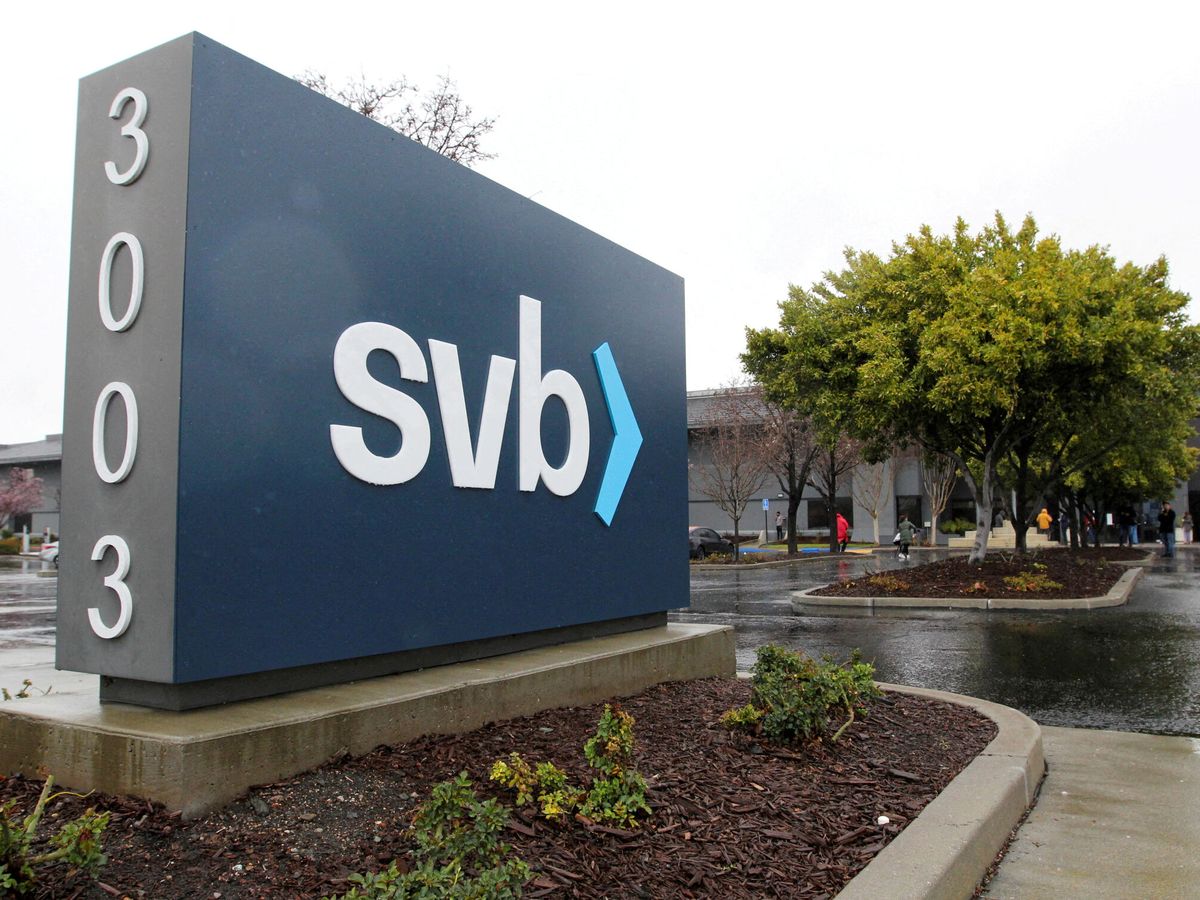Panic in the Valley
Original Source : Pánico en el Valle by @Enrique de la Rica

Things are getting chaotic at Silicon Valley Bank! After 40 years in operation, California authorities have had to intervene. How did it all start? In true American fashion...during a game of poker! Bill Biggerstaff and Robert Medearis originally had the idea to finance the companies in which venture capital had invested, but they ended up providing financial services to the investors themselves. Things went well for them, and they eventually captured 26% of the market share in Silicon Valley, becoming the largest bank in the region.
However, all good things come to an end. The COVID pandemic hit the economy hard, and central banks started printing money like crazy. As a result, everyone took advantage of the opportunity to get cheap loans, and venture capitalists were no exception.
There was a lot of money flowing around, and the pandemic made tech companies more popular than ever (while brick-and-mortar businesses were closed, digital businesses like Netflix, Zoom, and Microsoft were thriving). Hundreds of startups raised significant rounds of funding, but what could they do with all that liquidity? They deposited it.
Silicon Valley Bank received an enormous amount of deposits in a short amount of time (doubling in just one year). However, there was no way to invest or lend out all that money at such a fast pace! These deposits also generated costs for the bank (paying interest to depositors, branches to serve them, staff, technology, etc.). So the bank's executives decided to invest most of those deposits in government-backed bonds. While these bonds were an excellent guarantee, the interest rates were very low.
But then inflation started to skyrocket, and central banks raised interest rates to try to control it. As a result, the bonds that Silicon Valley Bank had purchased lost their value. Who would buy a bond with a lousy interest rate of 1.56% when they could buy a new bond with more than double the yield? It wasn't a big problem for the bank if the bonds lost their value, except they had to sell them before the 10-year term.
After the pandemic, everyone realized that the expectations placed on tech companies had been excessive. Many of the big companies started downsizing (Twitter, Facebook, Netflix, etc.), the valuations of publicly traded companies dropped, VC funds slowed down, and startups that had deposited their funding rounds in Silicon Valley Bank began to withdraw their money to cover their operating expenses. Deposits were being withdrawn quickly, and new deposits were being created slowly. As a result, rumors of "liquidity problems" started circulating in the Valley in early March.
The rumor was a prelude to the news. Silicon Valley Bank had no choice but to sell some of its assets to ensure liquidity. That's right; they had to sell the bonds they hadn't planned to sell for another ten years because no one would buy bonds with such a low return. They sold them for 80% of their original value, losing $1.8 billion in the process. The market panicked, and the bank's stock plummeted.
On Thursday, March 9th, the bank's CEO, Greg Becker, tried to calm the situation, but it backfired. Investment funds started recommending that their portfolio companies withdraw their funds from the bank. That day alone, $42 billion was withdrawn from the bank, leaving a shortfall of nearly $1 billion. That was the last straw.
And on Friday, the intervention came! What a mess! Hundreds of startups that had their money in Silicon Valley Bank would be left without liquidity this week. If they couldn't pay their employees or suppliers, they would have to suspend their service supply (such as SaaS platforms) to their customers (many of whom are large companies).
On social media, they are mocking entrepreneurs for not keeping their money in multiple accounts that do not exceed $250,000, but for many startups, maintaining eight accounts is an administrative nightmare that consumes resources that could be used to develop technology, write code, generate traction, raise more money...
It has been a weekend of panic in the Valley... and beyond... because the domino effect could be huge. That's why, this weekend, the Joe Biden administration has succumbed to the evidence that the collapse of the country's sixteenth largest bank by assets risks spreading to the entire US... and global financial system.
So, overcoming their previous reluctance, the authorities have announced that all bank deposits are guaranteed by the state, including those exceeding $250,000 (which is formally the maximum amount covered by the authorities). Additionally, the Federal Reserve launches what is, in practice, a covert bank bailout by creating a financing window that will accept a series of bonds whose value has plummeted due to last year's interest rate hikes as collateral.
Let's hope that this episode is just a "wake-up call" for operators to opt for a more gradual tightening of interest rates and a more intense monetary relaxation once inflation in the USA is under control.
But we cannot forget that in 2008, everyone thought that the first signs of subprime were just that... "wake-up calls".
Articles from Javier Cámara-Rica 🐝🇪🇸
View blog
In the era of information technology, you no longer need to print your résumé and hand-deliver it to ...

1/3 By 2029, if Grok scales via X and Gemini stalls, Google drops to 55-60% market share (from 80-86 ...

beBee is a versatile platform that bridges the gap between professionals, businesses, and services, ...
Related professionals
You may be interested in these jobs
-
Southern California Permanente Medical Group (SCPMG) is a physician-led partnership with strong values that support a patient-centered and evidence-based approach to medicine. · Provides our physicians with the resources and support systems needed to ensure every physician can fo ...
Lancaster1 week ago
-
The Coachella Valley Water District seeks a Training and Development Officer to develop and implement new curriculum District-wide. · ...
Palm Desert1 month ago
-
We are hiring Mechanic to Live. Work. Explore. in Death Valley National ParkInspects, diagnoses, and repairs mechanical defects/failures in various property maintenance equipment. · Instructs and/or trains maintenance workers regarding preventive maintenance. · Maintains a preven ...
Death Valley, CA1 month ago


Comments
Javier Cámara-Rica 🐝🇪🇸
2 years ago#10
A summary could be ………
Recently, Silicon Valley Bank has been at the center of a chaotic situation that has garnered the attention of California authorities. The bank, which had been in operation for 40 years, had become the largest bank in the region with 26% of the market share.
The COVID pandemic caused a surge of liquidity in the market, and venture capitalists were taking advantage of the opportunity to secure cheap loans. Deposits were pouring into Silicon Valley Bank, doubling in just one year. However, the bank was unable to invest or lend out all that money at such a fast pace, leading to executives' decision to invest most of the deposits in government-backed bonds.
The bonds, though secure, had low-interest rates, and the inflation that ensued caused the bonds' value to plummet. Startups that had deposited their funding rounds in Silicon Valley Bank started withdrawing their money to cover their operating expenses, causing rumors of "liquidity problems" to circulate.
Silicon Valley Bank was forced to sell some of its assets to ensure liquidity, including the bonds they had not planned to sell for another ten years. They sold them for 80% of their original value, losing $1.8 billion in the process. Investment funds recommended that their portfolio companies withdraw their funds from the bank, causing a panic that led to a $42 billion withdrawal from the bank in one day.
The intervention came the following day, leaving hundreds of startups without liquidity. The Joe Biden administration announced that all bank deposits would be guaranteed by the state, including those exceeding $250,000. Additionally, the Federal Reserve launched a financing window that would accept bonds whose value had plummeted as collateral, effectively initiating a covert bank bailout.
This episode is a reminder that gradual tightening of interest rates and more intense monetary relaxation once inflation is under control may be a better option than abrupt changes that can destabilize the financial system. The events of 2008 remind us that wake-up calls can sometimes be harbingers of a more significant crisis, and we should always be vigilant.
Jerry Fletcher
2 years ago#9
Javier, I don't think we have seen the last of the repercussions. This is a failure of a regulatory system that simply doesn't work. if some of my resources are correct this is a tsunami wrapped in silence and ha only begun.
Javier Cámara-Rica 🐝🇪🇸
2 years ago#8
#4 @Jerry Fletcher
The question that I, from my own ignorance, ask myself is whether the collapse of Credit Suisse is related to this.
Javier Cámara-Rica 🐝🇪🇸
2 years ago#7
thanks @Ken Boddie for your comment. What I find appealing about the article is its clear and concise explanation (credit to @Enrique de la Rica as the original author in Spanish) that can be easily grasped by anyone with a basic level of education.
Javier Cámara-Rica 🐝🇪🇸
2 years ago#6
#5 @Franci 🐝Eugenia Hoffman
I'm grateful for your positive feedback, but credit for the content goes to @Enrique de la Rica , the original author of the article in Spanish language. My role was simply to translate it into English to the best of my ability. I believe that it's a particularly compelling piece for a US audience, and I approached the translation from a neutral perspective, rather than that of a major corporation or financial institution.
Ken Boddie
2 years ago#5
I bow to your research and greater knowledge on this topic, @Javier 🐝 CR . Perhaps my comment on big corp greed was rather flippant, given the circumstances you have so comprehensively explained, but I remain sceptical about banking practices, banks and bankers in general.
Jerry Fletcher
2 years ago#4
Javier, my greatest concern was the lack of any news about this. Because I'm and investor, the organizations my angel group had invested in were all letting us know the steps they were taking before one word was heard on the broadcast networks. Everyone involved tried to keep it secret ostensibly to avoid a run on other banks. The first real report I saw was a clip from the BBC on YouTube. The net effect is that Federal regulators are now going to have to do a better job. (And I don't have a great deal of hope in that regard)
Javier Cámara-Rica 🐝🇪🇸
2 years ago#3
To be honest…. I really don't know what to think. Silicon Valley Bank is a bank that provides commercial banking services to technology and life science companies.
The Global Financial Crisis, also known as the 2008 financial crisis, was a severe worldwide economic crisis that began in 2008 and lasted for several years. It was caused by a combination of factors, including the subprime mortgage crisis, the collapse of the housing market, and the failure of large financial institutions.
It is important to note that Silicon Valley Bank did not play a significant role in the 2008 financial crisis, as it is a relatively small bank that focuses on a niche market. While it is possible for any financial institution to make poor decisions or engage in unethical behavior, there is no evidence to suggest that Silicon Valley Bank's intervention is related to the same issues that led to the 2008 financial crisis.
It is always important for companies to prioritize sound financial management over greed, and for regulators to enforce regulations that help prevent financial crises. However, it is important to not jump to conclusions without sufficient evidence or information.
But again… who knows !
Ken Boddie
2 years ago#2
Sounds like GFC deja vu? Big corp greed trumps sound financial management every time. 🤔
Javier Cámara-Rica 🐝🇪🇸
2 years ago#1
Summary :
Silicon Valley Bank, the largest bank in the region, lost $1.8 billion after investing most of its deposits in government-backed bonds with low-interest rates. As the pandemic hit the economy, many startups deposited their funding rounds in the bank, which created a liquidity problem when they started withdrawing their money. The bank had to sell some of its assets, causing a panic in the market, and resulting in $42 billion being withdrawn in one day. On Friday, the authorities intervened, and all bank deposits are now guaranteed by the state, including those exceeding $250,000.